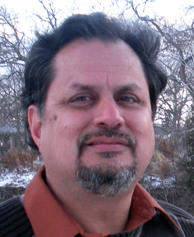
Louis Mendoza, an author and scholar who rode his bicycle 8,000 miles around the country to understand how Latino immigration has changed the United States will offer a free public lecture 3 p.m. March 28 at the Gaughan Center.
Louis Mendoza, chair of the Department of Chicano Studies and vice provost to the Office for Equity and Diversity at the University of Minnesota, will be the keynote speaker of the Institute for Ethnic Studies' Spring Celebration. His talk, "Conversations Across Our America," will be in the Jackie Gaughan Multicultural Center's Ubuntu Room beginning at 3 p.m. A question-and-answer session, book signing and reception will follow.
The annual celebration is designed to inform the campus and local community about the discipline of ethnic studies and to celebrate ethnic diversity in the state of Nebraska.
"Dr. Mendoza examines complex issues like immigration from different perspectives and that makes him a perfect speaker to help raise awareness about what we do," said Amelia Montes, director of the UNL Institute for Ethnic Studies. "Ethnic Studies uses an interdisciplinary research approach that analyzes how ethnic groups interact in society and combines methods from traditional disciplines like history and sociology to illuminate the complexities of race, ethnicity and power."
During his bike ride around the country in 2007, Mendoza met with a broad range of people, including Latino immigrants who had varied experiences coming to this country. He did it, he said, to help move beyond the limited portrayal of immigration as a conflict between newcomers and citizens. His experience became the basis for two books, including his forthcoming work, "Conversations Across Our America: Talking About Immigration and the Latinoization of the United States." It's scheduled for release this summer.
UNL's Institute for Ethnic Studies, founded in 1972, is composed of three programs: African American and African Studies, Latino and Latin American Studies and Native American Studies. The program draws from multiple fields, including history, sociology, anthropology, English, political science, psychology and modern languages and literatures. It offers students the opportunity to explore and examine ethnically diverse populations within and outside the United States.
- Jean Ortiz Jones, University Communications